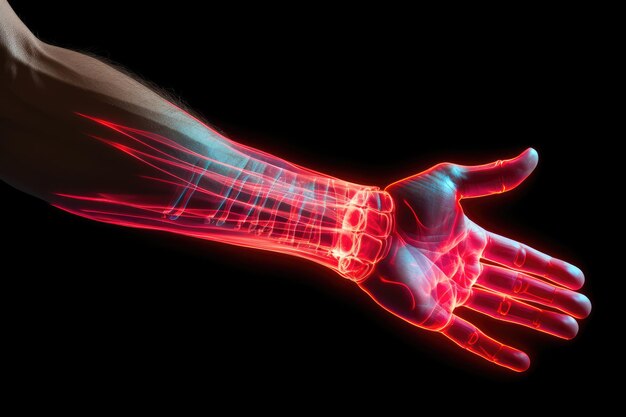Carpal Tunnel Syndrome Overview
What is Carpal Tunnel Syndrome?
Carpal tunnel syndrome (CTS) is a condition that occurs when the median nerve, which runs through the carpal tunnel in the wrist, becomes compressed. The carpal tunnel itself is formed by wrist bones (carpals) and a ligament, housing the tendons that bend the fingers and thumb. This compression can lead to symptoms like pain, numbness, burning, or tingling in the thumb, index, middle, and part of the ring finger.
Symptoms often worsen at night or when performing tasks that involve holding objects like phones or steering wheels, bending the wrist, or maintaining the fingers in a fist. The condition may cause weakness, clumsiness, reduced sensation, and reduced grip strength.
Causes of Carpal Tunnel Syndrome
The exact cause of CTS isn’t always clear, but several factors can increase the risk, such as:
- Repetitive hand activities (e.g., typing, gripping)
- Diabetes (Type 1 or Type 2)
- Tendon inflammation
- Wrist fractures or injuries
- Rheumatoid arthritis
- Pregnancy
- Menopause
- Thyroid issues
Diagnosis
A healthcare professional can diagnose CTS by examining the wrist and hand. Since CTS symptoms can overlap with other conditions, assessments may include checking the neck or performing:
- Nerve conduction studies (optional)
- Blood tests to rule out contributing factors
Treatment Options
1. Activity Modification:
- Stay active and avoid activities that strain the wrist.
- Alternate between heavier and lighter activities and take breaks as needed.
- Consider padded handles for activities like cycling and gardening.
2. Wrist Splints:
A wrist splint keeps the wrist straight, particularly useful at night, to reduce nerve compression. A splint may also be used during certain repetitive activities but should not restrict movement throughout the day.
3. Exercises:
Wrist exercises focused on movement, stretching, and strengthening can improve function and alleviate symptoms.
4. Pain Management:
- Pain medication: To improve comfort and mobility.
- Corticosteroid injections: May be recommended if pain persists, helping to reduce inflammation but not necessarily curing the condition.
5. Surgery:
In cases where other treatments have failed, a procedure called carpal tunnel decompression may be performed to relieve pressure on the median nerve by opening the roof of the carpal tunnel.
Returning to Work
Depending on the severity of your symptoms and the nature of your work, some time off may be needed to aid recovery. A gradual return to daily activities can help build strength and stamina, even if symptoms persist slightly.
When to Seek Further Help
If symptoms do not improve or worsen after six weeks of self-management, contact a healthcare professional for further advice and potential referral to musculoskeletal (MSK) services.
Mental Wellbeing
Managing any chronic condition, including CTS, can impact mental health. Be sure to address stress, anxiety, or other concerns with your healthcare provider to support your overall recovery and wellbeing.







